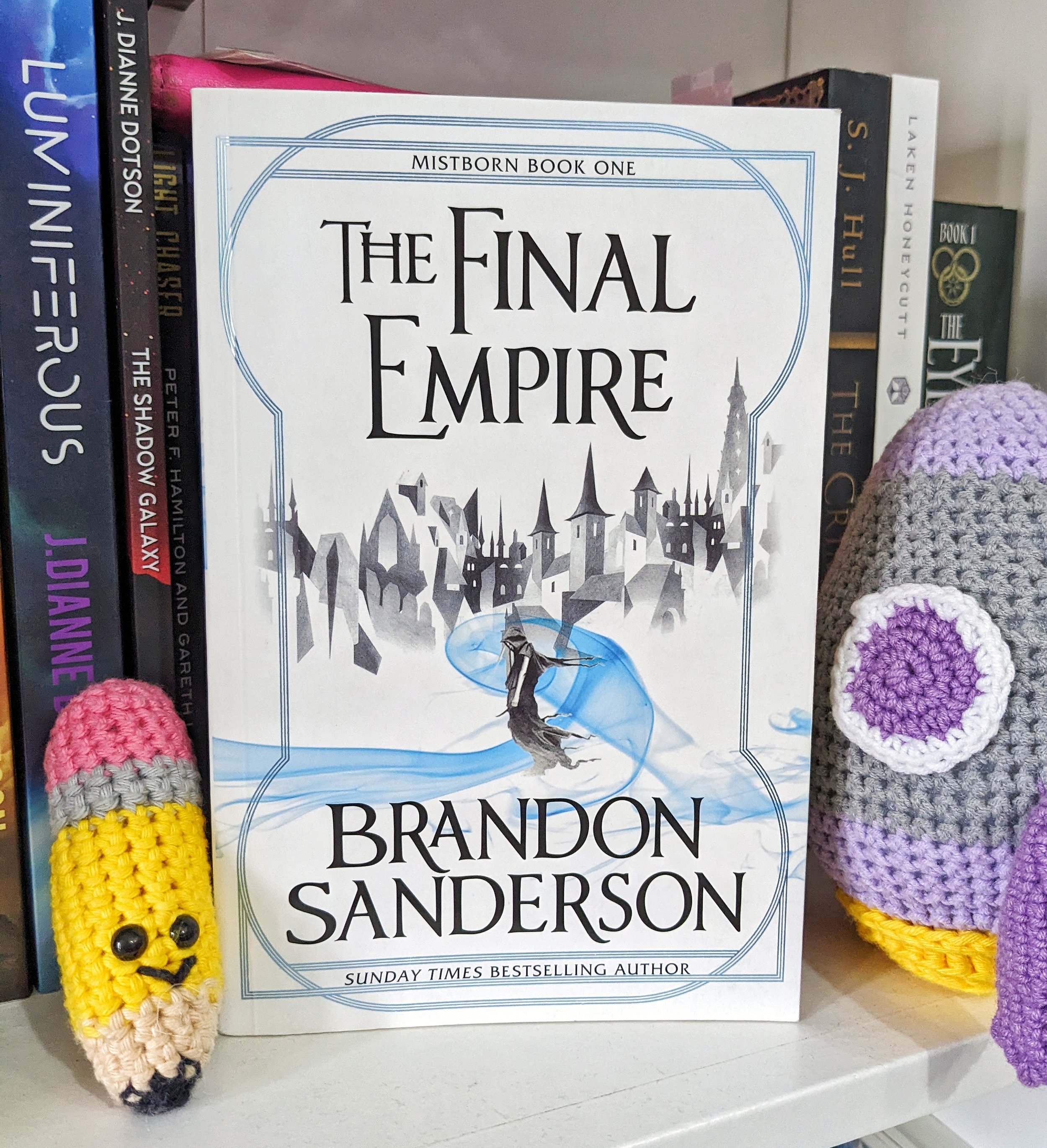Book Review: The Final Empire
Book one in the first Mistborn trilogy by Brandon Sanderson.
Brandon Sanderson is one of the most successful and prolific fantasy authors of recent years. I’m sure we’re all astounded at the blistering pace he puts out these ungodly huge tomes. As such, I’ve been really curious to see what his writing is actually like, and why it’s been so well-received. Taking advice from various Booktubers and other commentators, I decided to start with his first Mistborn trilogy, which is said to be a good entry point to his work. And, you know what? I get it. The Final Empire is the first book in the original Mistborn trilogy, and is sometimes simply titled Mistborn itself - in fact, I believe there’s some newer editions in the US that drop the actual title from the cover altogether in favour of the series name. Even though it’s more on the YA side of things, it’s still a massive book, and it took me over a month to finish reading it. That’s not to say I didn’t have a great time, though. So, let’s dive in.
Blurb
A thousand years ago evil came to the land and has ruled with an iron hand ever since. The sun shines fitfully under clouds of ash that float down endlessly from the constant eruption of volcanoes. A dark lord rules through the aristocratic families and ordinary folk are condemned to lives in servitude, sold as goods, labouring in the ash fields.
But now a troublemaker has arrived and there is rumour of revolt. A revolt that depends on a criminal no-one can trust and a young girl who must master Allomancy - the magic that lies in all metals.
Review
The Final Empire is a fantastic introduction to the world of Scadrial, ruled by the oppressive, authoritarian regime of the Final Empire. I very much enjoyed my time with it, and the sheer size of the book allowed for a lot of space to get heavily invested in the characters. This is a multi-POV book, with the principle POV characters being Kelsier, the charismatic and honourable head of a thieving crew in the city of Luthadel, and Vin, a sixteen-year-old street thief carrying a lot of trauma and trust issues. Both possess the remarkable ability to wield Allomancy, a type of magic which is based on the consumption of metals. Right off the bat, the magic system of this series is thoroughly fascinating, unique and incredibly well put-together. And it’s not the only magic system at play in the book either. Allomancy and its related magics really exemplify the concept of the “hard magic system” in fiction. It’s utterly brilliant, and contrasts the magic system in, say, Earthsea, which is much more naturalistic and mysterious. While both have clear limitations and would be “hard” systems (Earthsea’s being based on knowing an object’s true name; and Mistborn on the consumption and burning of the correct metals), Brandon Sanderson takes a much more scientific approach, and takes account of Newtonian physics in the use of the powers associated with each metal.
Despite being such a massive book, the pacing of the story is thoroughly appropriate for its size. There’s plenty happening and it all moves along nicely, with no sticking points. Kelsier and Vin are fantastic characters with a lot of great depth to them. Vin in particular is believable as a survivor, and the way she adjusts to life with her new crew, and comes into her powers, is well-earned. All the supporting characters have plenty of space for backstory and depth, too, and it’s all woven in seamlessly. They’re all distinct from each other, with their own powers and specialties. The Final Empire is really laid out like a heist novel, but it doesn’t strictly follow that pattern, and subverts the tropes nicely.
The plot itself is really great. I loved it, start to finish. There’s not a lot more to say on that aspect without rambling on into spoilers. There are some aspects to the rebellion and class struggle themes which come out a bit wonky, but overall it was an enjoyable experience.
I’ve heard people complain about Brandon’s prose, however. I don’t see it. It’s perfectly functional and fits with the tone of the book. It’s not particularly florid or complex - not like Ursula K. Le Guin’s at all, for instance - but equally it didn’t strike me as any lesser. It presented an enjoyable and effortless reading experience, which I think is probably intentional when you’ve got a book this long.
The only thing that kind of grated on me was the amount of times the characters speak each other’s names in dialogue. It’s a little excessive. If you pay attention to everyday speech in the real world, you’ll find that names are hardly, if ever, spoken in conversation. They’re usually only needed to catch someone’s attention when body language alone wouldn’t work. In the book’s dialogue, it comes across as needlessly condescending.
Overall, I’m very much looking forward to continuing this trilogy in the future. I have the box-set on my shelves, so the next two are waiting for me. I do need to take a break from it, though, because otherwise it would take me the rest of the year to get through just those! They look a bit longer than this one, too. Once I’m done with this Mistborn trilogy, I might have to give the Stormlight Archives a go.
The Final Empire: Highly recommended for fans of epic fantasy.

